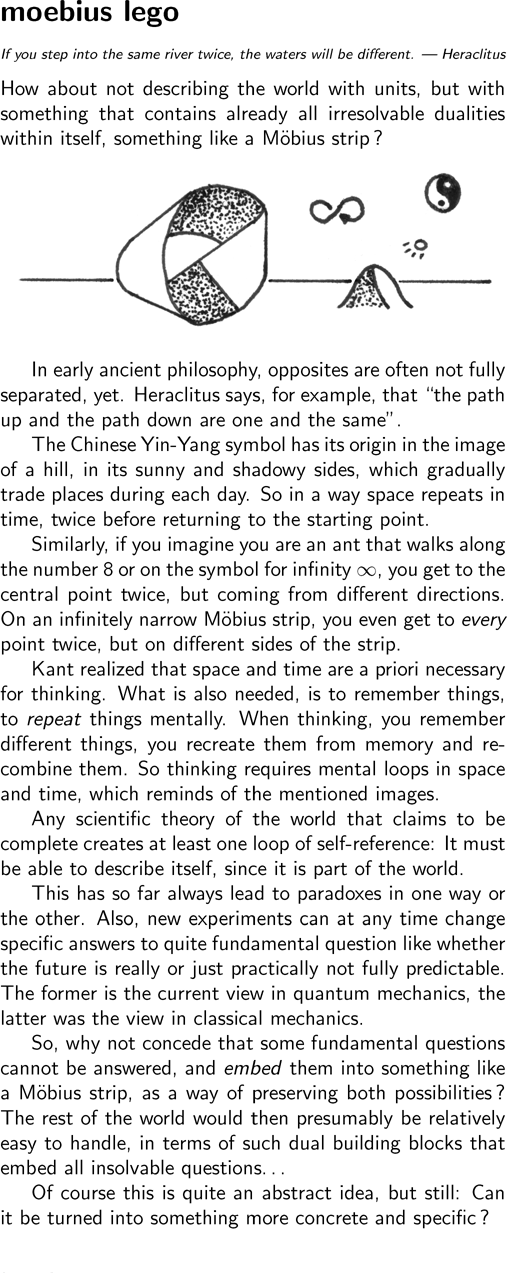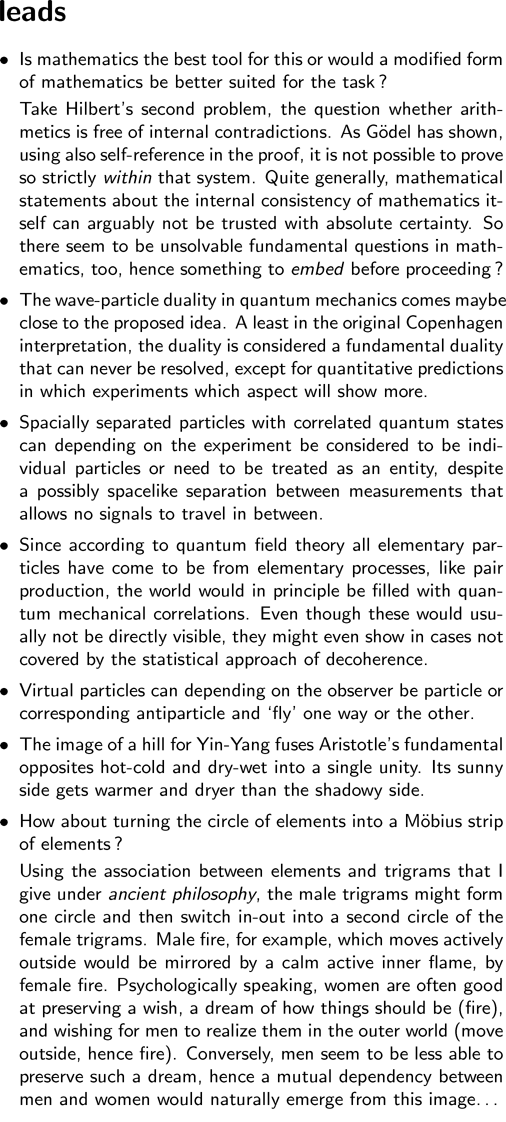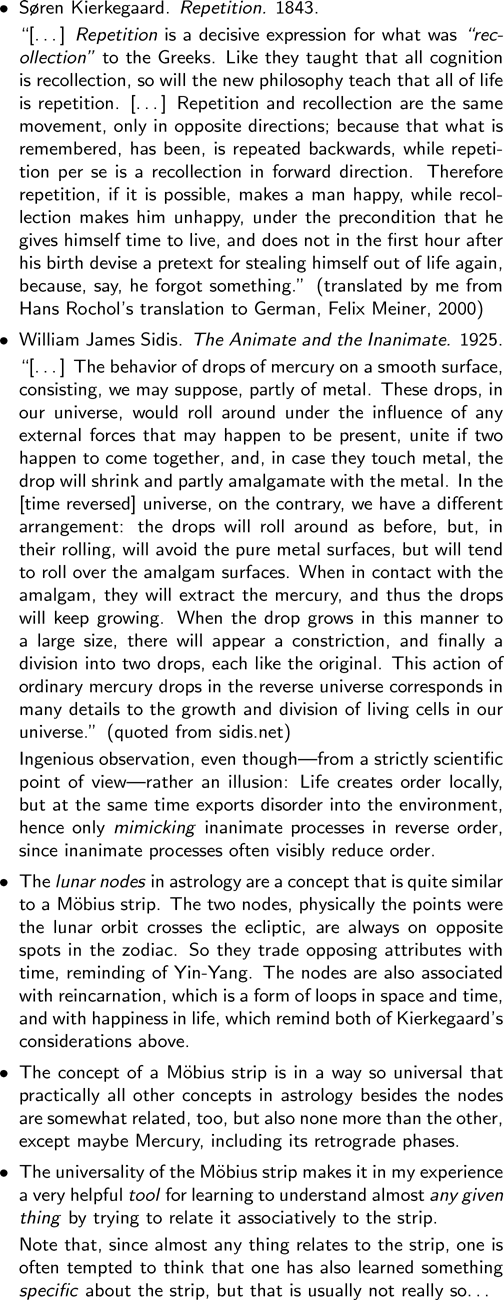|
|
moebius lego
If you step into the same river twice, the waters will be different. - Heraclitus
How about not describing the world with units, but with
something that contains already all irresolvable dualities
within itself, something like a Möbius strip ?
[image]
In early ancient philosophy, opposites are often not fully
separated, yet. Heraclitus says, for example, that "the path
up and the path down are one and the same".
The Chinese Yin-Yang symbol has its origin in the image
of a hill, in its sunny and shadowy sides, which gradually
trade places during each day. So in a way space repeats in
time, twice before returning to the starting point.
Similarly, if you imagine you are an ant that walks along
the number 8 or on the symbol for infinity ∞, you get
to the central point twice, but coming from different directions.
On an infinitely narrow Möbius strip, you even get to
every point twice, but on different sides of the strip.
Kant realized that space and time are a priori necessary for
thinking. What is also needed, is to remember things, to
repeat things mentally. When thinking, you remember
different things, you recreate them from memory and recombine
them. So thinking requires mental loops in space and time,
which reminds of the mentioned images.
Any scientific theory of the world that claims to be complete
creates at least one loop of self-reference: It must be able
to describe itself, since it is part of the world.
This has so far always lead to paradoxes in one way or the
other. Also, new experiments can at any time change specific
answers to quite fundamental question like whether the future
is really or just practically not fully predictable. The former
is the current view in quantum mechanics, the latter was the
view in classical mechanics.
So, why not concede that some fundamental questions cannot be
answered, and embed them into something like a Möbius
strip, as a way of preserving both possibilities ? The rest
of the world would then presumably be relatively easy to handle,
in terms of such dual building blocks that embed all insolvable
questions...
Of course this is quite an abstract idea, but still:
Can it be turned into something more concrete and specific ?
leads
Is mathematics the best tool for this or would a modified form
of mathematics be better suited for the task ?
Take Hilbert's second problem, the question whether arithmetics is free
of internal contradictions. As Gödel has shown, using also self-reference
in the proof, it is not possible to prove so strictly within that
system. Quite generally, mathematical statements about the internal
consistency of mathematics itself can arguably not be trusted with
absolute certainty. So there seem to be unsolvable fundamental questions in
mathematics, too, hence something to embed before proceeding ?
- The wave-particle duality in quantum mechanics comes maybe close
to the proposed idea. A least in the original Copenhagen interpretation,
the duality is considered a fundamental duality that can never be
resolved, except for quantitative predictions in which experiments
which aspect will show more.
- Spacially separated particles with correlated quantum states can
depending on the experiment be considered to be individual particles
or need to be treated as an entity, despite a possibly spacelike
separation between measurements that allows no signals to travel
in between.
- Since according to quantum field theory all elementary particles
have come to be from elementary processes, like pair production, the
world would in principle be filled with quantum mechanical correlations.
Even though these would usually not be directly visible, they might
even show in cases not covered by the statistical approach of decoherence.
- Virtual particles can depending on the observer be particle or
corresponding antiparticle and 'fly' one way or the other.
- The image of a hill for Yin-Yang fuses Aristotle's fundamental
opposites hot-cold and dry-wet into a single unity. Its sunny side
gets warmer and dryer than the shadowy side.
How about turning the circle of elements into a
Möbius strip of elements ?
Using the association between elements and trigrams that I give under
ancient philosophy, the male trigrams might form one circle
and then switch in-out into a second circle of the female trigrams.
Male fire, for example, which moves actively outside would be mirrored
by a calm active inner flame, by female fire. Psychologically speaking,
women are often good at preserving a wish, a dream of how things should
be (fire), and wishing for men to realize them in the outer world (move
outside, hence fire). Conversely, men seem to be less able to preserve
such a dream, hence a mutual dependency between men and women would
naturally emerge from this image...
Søren Kierkegaard. Repetition. 1843.
"[...] Repetition is a decisive expression for what
was "recollection" to the Greeks. Like they taught that
all cognition is recollection, so will the new philosophy teach
that all of life is repetition. [...] Repetition and recollection
are the same movement, only in opposite directions; because that
what is remembered, has been, is repeated backwards, while
repetition per se is a recollection in forward direction. Therefore
repetition, if it is possible, makes a man happy, while recollection
makes him unhappy, under the precondition that he gives himself time
to live, and does not in the first hour after his birth devise a
pretext for stealing himself out of life again, because, say, he
forgot something." (translated by me from Hans Rochol's translation
to German, Felix Meiner, 2000)
William James Sidis. The Animate and the
Inanimate. 1925.
"[...] The behavior of drops of mercury on a smooth surface,
consisting, we may suppose, partly of metal. These drops, in our
universe, would roll around under the influence of any external
forces that may happen to be present, unite if two happen to come
together, and, in case they touch metal, the drop will shrink and
partly amalgamate with the metal. In the [time reversed] universe,
on the contrary, we have a different arrangement: the drops will
roll around as before, but, in their rolling, will avoid the pure
metal surfaces, but will tend to roll over the amalgam surfaces.
When in contact with the amalgam, they will extract the mercury,
and thus the drops will keep growing. When the drop grows in this
manner to a large size, there will appear a constriction, and
finally a division into two drops, each like the original. This
action of ordinary mercury drops in the reverse universe
corresponds in many details to the growth and division of living
cells in our universe." (quoted from sidis.net)
Ingenious observation, even though - from a strictly scientific point
of view - rather an illusion: Life creates order locally, but at the
same time exports disorder into the environment, hence only
mimicking inanimate processes in reverse order, since
inanimate processes often visibly reduce order.
- The lunar nodes in astrology are a concept that is
quite similar to a Möbius strip. The two nodes, physically the
points were the lunar orbit crosses the ecliptic, are always on
opposite spots in the zodiac. So they trade opposing attributes
with time, reminding of Yin-Yang. The nodes are also associated
with reincarnation, which is a form of loops in space and time,
and with happiness in life, which remind both of Kierkegaard's
considerations above.
- The concept of a Möbius strip is in a way so universal that
practically all other concepts in astrology besides the nodes are
somewhat related, too, but also none more than the other, except
maybe Mercury, including its retrograde phases.
The universality of the Möbius strip makes it in my experience
a very helpful tool for learning to understand almost
any given thing by trying to relate it associatively
to the strip.
Note that, since almost any thing relates to the strip, one is often
tempted to think that one has also learned something specific
about the strip, but that is usually not really so...
|
















